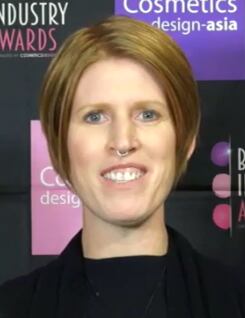The Master’s Degree program in cosmetics and fragrance marketing and management is a unique one, accepting only students with at least three years of corporate-level work experience in beauty. And teaching faculty themselves have significant executive experience with beauty corporations, such as L'Oréal, The Estée Lauder Companies, Shiseido, and Conair. The program’s industry support extends even further, with advisory board members from multinational fragrance and beauty companies (like Firmenich and Unilever), influential media (like WWD), professional organizations (like CEW), and more. This year’s capstone event was sponsored by Coty, another company that has been involved with the program in one way or another for years.
Since the program began, FIT’s CFMM administrators have endeavored to make it a place where ideas, data, and advice for the industry originate. “The program provides advanced education for emerging executives,” according to the program from last Wednesday’s event. And as hoped, “the program is a think tank of innovative leadership for the beauty industry.”
2018 speakers
This year’s 20 graduates presented the topic of transparency in two sections. First, they spoke about clean beauty. Second, they spoke about glassbox leadership / organizations. The presentations comprised original research data and field observations from around the world.
The CFMM class of 2018:
- Bea Asavajaru (Social Media, Shiseido Cosmetics)
- Jessica Bibby (Marketing, The Estée Lauder Companies)
- Diane Cortet (Marketing, Parfums Christian Dior, LVMH)
- Zuheidi Elangbawy (Digital Marketing, L’Oréal Paris)
- Bulbul Hooda (Marketing, Shiseido Americas)
- Michelle Huang (Digital Marketing and E-Commerce, Unilever)
- Kelsey Kreamer (Market Research, L’Oréal USA)
- Marlene Lam (Account Manager, JWALK, Shiseido Americas)
- Jeanne Loftus (International Business Development, L’Oréal USA)
- Jian McMillon (Global Communications, NARS Cosmetics)
- Jennifer Nuttal (Global Marketing, Revlon Inc.)
- Fred Orsita (Program Manager, Technology Incubator, L’Oréal USA)
- Tanuj Puri (Finance, Revlon Inc.)
- Elizabeth Rentschler (Product Development, New Avon LLC)
- Alexandra Gonzales Repetto (Global Marketing, L’Oréal USA)
- Manal Sarris (Strategic Business Development, IFF)
- Lindsay Powell Schwartz (Influencer Marketing and Public Relations, Coty)
- Gena Surphlis (New Business Development, Firmenich)
- Shelagh Wong (Strategy / Business Affairs, The Estée Lauder Companies)
- Jasmine Yoon (Marketing, Shiseido Cosmetics America)
2018 insights
Explaining clean beauty, what it encompasses, and what it signifies, the presenters assert that, “The emergence and growth of the clean beauty movement is a symptom of consumers' growing mistrust in the beauty industry and is likely only the tip of the iceberg. As consumers aim to gain control of their lives by making more informed decisions, beauty brands are at risk of losing customers due to a lack of transparency,” according to a summary of the presentation circulated in an FIT media release.
The summary continues, “By embracing technological innovations, prioritizing relatability, and putting control into the hands of consumers brands have the opportunity to evolve beauty industry practices, rebuild trust, and reinvent the way consumers view the beauty industry.”
Describing the idea of glassbox business, the presentation summary states, “In a world where information is impossible to hide and constant change is the norm, companies—like countries—are being held to a new level of scrutiny. It is not enough to talk the talk: action is required. If not, employees and consumers will migrate.”
The students suggest that beauty corporations think and act in terms of an insumer—a consumer and employee all in one—and effectively streamline internal and external communications.
Learn more about FIT’s Cosmetics and Fragrance Marketing and Management program here.
And, read the 2018 whitepapers on Transparent Beauty here.
---

Deanna Utroske, CosmeticsDesign.com Editor, covers beauty business news in the Americas region and publishes the weekly Indie Beauty Profile column, showcasing the inspiring work of entrepreneurs and innovative brands.
